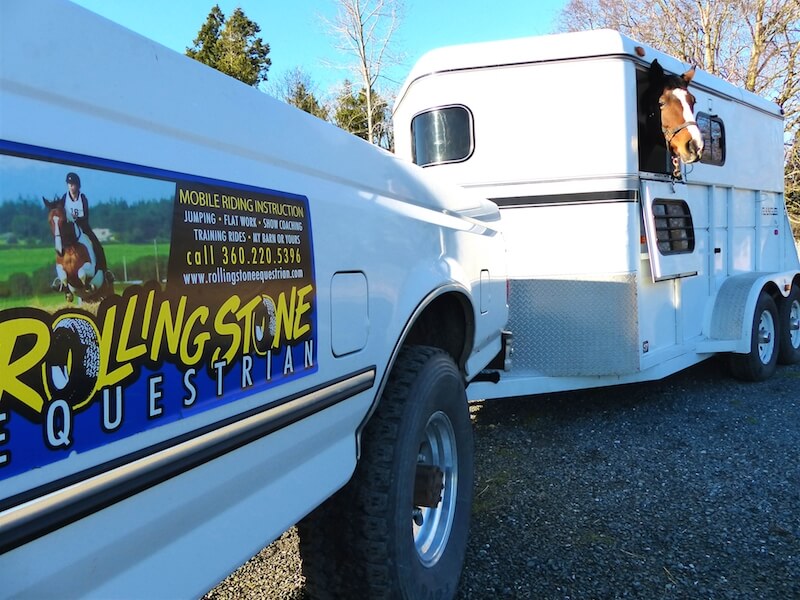High Tech House Calls for Horse Owners
by Andrea Heimer
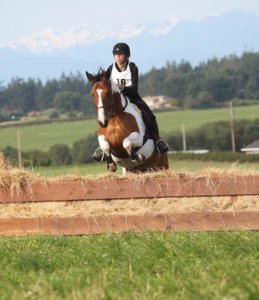
Whenever I tell someone I operate Rolling Stone Equestrian, a mobile riding instruction and training service, the typical response is a confused look followed by this question, “What exactly is a mobile training service?” My answer is five magic words that sum up my business: house calls for horse owners.
There was never a moment when I didn’t want to be a riding instructor. From my first lesson at just seven- years-old I was hooked, and not just on the riding. I was fascinated by the instructor’s role in the experience, the person who guided people through the difficult task of learning horsemanship, through the ups and downs, the brick walls and the breakthroughs. The importance of the student/instructor relationship stood out to me even then. At the end of my first lesson I recall halting my trusty school horse, a portly Quarter Horse named Dan, squarely in front of my instructor, looking her in the eye and saying, “When I grow up, I want to do what you do.”
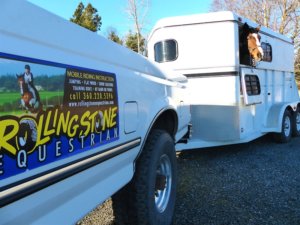
Fast forward to present day, which finds me doing exactly what my seven-year-old self had hoped. I knew when I started my own training business it would need to be efficient, useful, and unique to succeed. I listened when fellow horse-owners spoke about their “wish-lists” for furthering their riding. An overwhelming number said they would jump at the chance to receive instruction in the comfort of their own home or boarding barn. The idea of an instructor who made house calls made good business sense to me, and before long I put wheels in motion to make Rolling Stone Equestrian a reality.
The idea of a traveling trainer fit neatly with my own teaching philosophy. Having ridden in my share of high-volume barns with a one-size-fits-all approach to learning, my goal had always been to offer highly personalized instruction. By making house calls a large part of my business I am able to do just that. Rolling Stone Equestrian’s schedule consists of just two to three sessions per day. By limiting the number of sessions I teach, each horse and rider team gets my full attention, “teacher burn-out” is eliminated, and clients experience a lesson akin to a mini-clinic tailored to their situation.
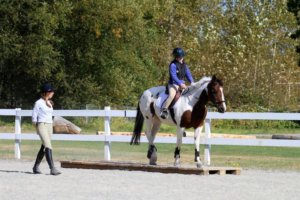
Not all of my clients are horse-owners. Many are simply enthusiasts looking to further their skills without the commitment of owning an animal. I’m able to accommodate these students with the help of my phenomenal school horse, Dixie. Dixie has competed in western events, dressage, jumping, and eventing—a true all-around athlete. I am proud to call her my coworker. She teaches riders from 5 to 71, offering just the right amount of cooperation and good-natured challenge. Since starting this business Dixie and I have trailered all over Whatcom County for students who would not have access to a horse otherwise.The opportunity to ride Dixie in a lesson is now even easier to coordinate as this month we are celebrating the completion of an all-weather outdoor arena at our private barn.
Rolling Stone Equestrian offers other creative ways to be an effective service for riders. For example, technology plays an important role in my instruction. A video camera and iPad are available at each session. This allows me to record video in real time—a sticky canter transition for example—and show it to the student immediately. We can even slow the video down to pinpoint the exact moment of a problem. Sometimes this visual aid makes all the difference in a student’s understanding. Alternately, it is quite useful for recording excellent work to play back to the student as positive reinforcement. In both instances a picture really is worth a thousand words!
Not long after Rolling Stone Equestrian opened its trailer doors I began to hear about another item on the horse-owner “wish list.” Many riders expressed interest in getting their horses out of the arena regularly to gain exposure to different places and new stimuli—in short, they wanted better all-around mounts. Horse owners are many things, but time-rich generally isn’t one of them and it seemed scheduling enough experiences to increase their horse’s coping skills wasn’t happening. After speaking with one client aboard a keen but reactive trail horse hopeful, I jokingly suggested the horse come to my facility for a “boot camp” of sorts. The client answered with a resounding “yes” and so RSE Boot Camp was born.
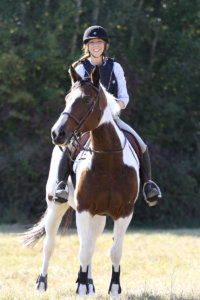
RSE Boot Camp is a training service offered in two-month increments at our private barn. Like my instructing program, I keep the training portion small—never more than two horses at a time—to ensure very personalized attention. The objective is to provide each horse with the tools to handle itself in a variety of situations. Throughout the horse’s stay I teach Equine “Good Citizenship” 101, which introduces or reinforces various ground skills. Horses are also ridden three times per week in accordance with the dressage training pyramid and work toward developing softness, lightness, and forward energy. But the real meat of the program lies in the environments in which horses learn these traditional skills. In RSE Boot Camp the horse gets out. Horses in the program are ridden in outdoor arenas, indoor arenas, wide open spaces, around machinery, cows, horse-wise dogs, and anything else safe and useful I can find. Horses are also trailered for a training session off-site at least once per week, ridden in schooling shows and clinics if appropriate, and exposed to as many safe types of footing as possible including arena sand, grass, uneven terrain, and water.
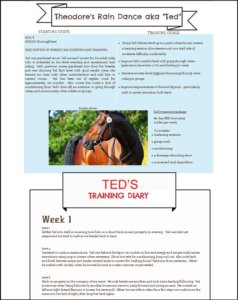
To track progress I set up private, password protected pages on my website for each horse enrolled in RSE Boot Camp. The page acts as a sort of training scrap book for the owner—documenting training issues and milestones with the help of diary entries, photos, and videos. This service is particularly helpful during the “plateau” periods of training when it can sometimes seem that progress has stalled—with a few clicks of a mouse the owner can easily see how far they’ve come! It is also a useful tool in gaining perspective on each horse’s learning style and valuable information for the owner when the program is over.
Exciting as it is to watch Rolling Stone Equestrian grow, I most enjoy what caught my attention on that kindly Quarter Horse so many years ago: the working relationship between instructor and student. That relationship is one I take pride in fostering. I can hardly wait to help the next horse and rider team achieve their riding goals!
Starting this month Rolling Stone Equestrian is accepting new horses for RSE Boot Camp and new students for riding instruction. Visit www.rollingstoneequestrian.com* or www.facebook.com/rollingstoneequestrian** for more information.
*This link was no longer active at the time this article was added to the website in 2018.
**This link was no longer active at the time this article was added to the website in 2018.
Published April 2013 Issue

The Northwest Horse Source is an independently owned and operated print and online magazine for horse owners and enthusiasts of all breeds and disciplines in the Pacific Northwest. Our contemporary editorial columns are predominantly written by experts in the region, covering the care, training, keeping and enjoyment of horses, with an eye to the specific concerns in our region.


